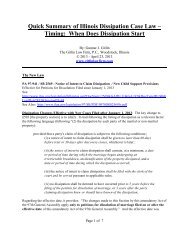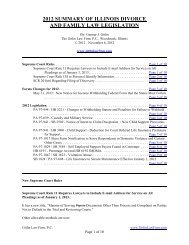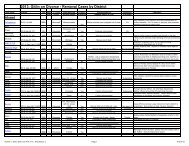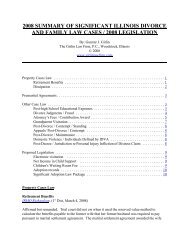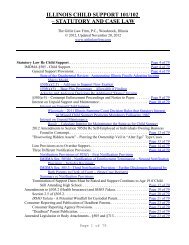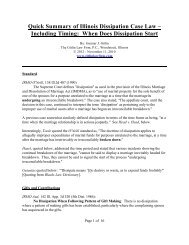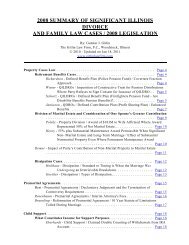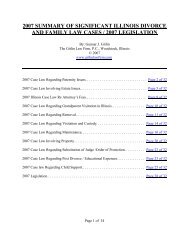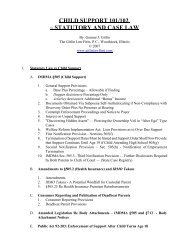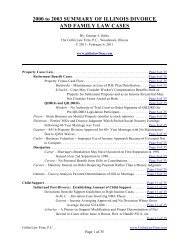Illinois Attorney's Fees and the Leveling the Playing Field Act
Illinois Attorney's Fees and the Leveling the Playing Field Act
Illinois Attorney's Fees and the Leveling the Playing Field Act
Create successful ePaper yourself
Turn your PDF publications into a flip-book with our unique Google optimized e-Paper software.
appellate court cited previous precedent as follows:<br />
The party seeking attorney fees has <strong>the</strong> burden of establishing an inability to pay<br />
those fees <strong>and</strong> <strong>the</strong> ability of <strong>the</strong> o<strong>the</strong>r spouse to do so. Schneider, 343 Ill. App. 3d<br />
at 637. Financial inability to pay <strong>the</strong> fees exists where <strong>the</strong> payment would strip a<br />
party of his or her means of support <strong>and</strong> undermine <strong>the</strong> party's economic stability,<br />
but <strong>the</strong> party need not show destitution. In re Marriage of Carpel , 232 Ill. App.<br />
3d 806, 832 (1992). Still, <strong>the</strong> ability to pay does not mean <strong>the</strong> ability to pay<br />
without pain or sacrifice. Schneider, 343 Ill. App. 3d at 638.<br />
In ano<strong>the</strong>r striking finding <strong>the</strong> appellate court stated:<br />
Appellants argue that "[c]learly, [respondent] is unable to pay <strong>the</strong> balance of her<br />
attorneys' fees in <strong>the</strong> amount of $67,304 ($73,304 less $6,000 award)." Appellants<br />
misconstrue <strong>the</strong> issue, as <strong>the</strong> question is whe<strong>the</strong>r respondent can pay $4,000,<br />
which is <strong>the</strong> remainder of <strong>the</strong> $10,000 attorney fee award deemed "reasonable" by<br />
<strong>the</strong> trial court.<br />
Because of <strong>the</strong> above quote, <strong>the</strong> appellate court believed that <strong>the</strong> interests of <strong>the</strong> law firm were<br />
potentially adverse to that of <strong>the</strong>ir client, <strong>the</strong> ex-wife, when it stated:<br />
Both respondent <strong>and</strong> [<strong>the</strong> law firm] are represented by <strong>the</strong> same attorney on<br />
appeal even though <strong>the</strong>ir interests potentially conflict. For example, it was in [<strong>the</strong><br />
law firm’s] interest to obtain a ruling that <strong>the</strong> trial court abused its discretion in<br />
awarding just $10,000 in attorney fees <strong>and</strong> that $73,490.82 was a reasonable<br />
amount of fees. However, such a ruling could have been adverse to respondent, as<br />
we might still have held that <strong>the</strong> trial court did not err in apportioning 40% of <strong>the</strong><br />
fees to respondent. Respondent would <strong>the</strong>n be liable to [that law firm] for<br />
$29,396.28, ra<strong>the</strong>r than just <strong>the</strong> $4,000 she owed under <strong>the</strong> trial court's decision.<br />
As such, it was contrary to respondent's interest to challenge <strong>the</strong> trial court's<br />
ruling that $10,000 was a reasonable amount of attorney fees. The court <strong>the</strong>n<br />
instructed, "In this case, <strong>the</strong>re is no indication that appellants' attorney did not<br />
make <strong>the</strong> necessary disclosures <strong>and</strong> obtain appellants' consent. We point out <strong>the</strong><br />
conflict of interest only to remind practitioners of <strong>the</strong> potential perils involved<br />
with joint representation.<br />
It is suggested that <strong>the</strong> appellate court in Beeler went beyond <strong>the</strong> issues which were specifically<br />
in dispute because of its apparent displeasure that a post-decree dispute involving such relatively<br />
minor matters totaled more than $70,000. The appellate court seemed to limit fees that could be<br />
sought from <strong>the</strong> firm’s own client to <strong>the</strong> remaining $4,000 instead, of <strong>the</strong> remaining $64,000+<br />
owed to <strong>the</strong>m by <strong>the</strong> terms of <strong>the</strong>ir contract. A fee petition against a lawyer's own client is not<br />
limited to <strong>the</strong> fees which are customary in <strong>the</strong> community. The st<strong>and</strong>ards for a fee petition under<br />
Section 508(c) differ from a contribution petition where fees are more limited. This decision was<br />
at first published <strong>and</strong> it was very recently changed to a Rule 23 order.<br />
Gunnar J. Gitlin Gitlin Law Firm, P.C. www.gitlinlawfirm.com




